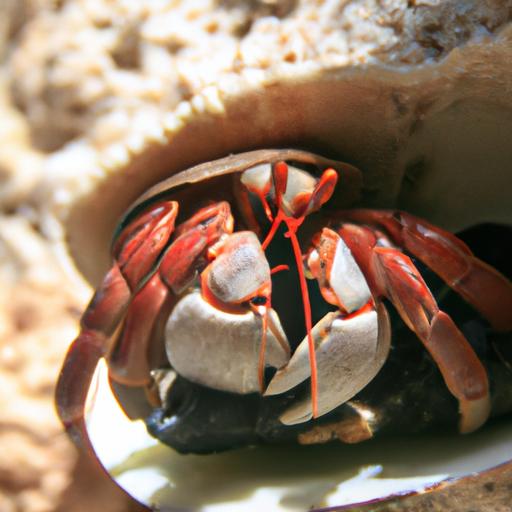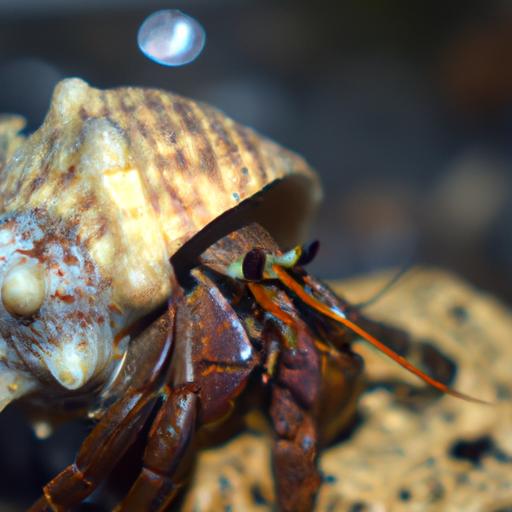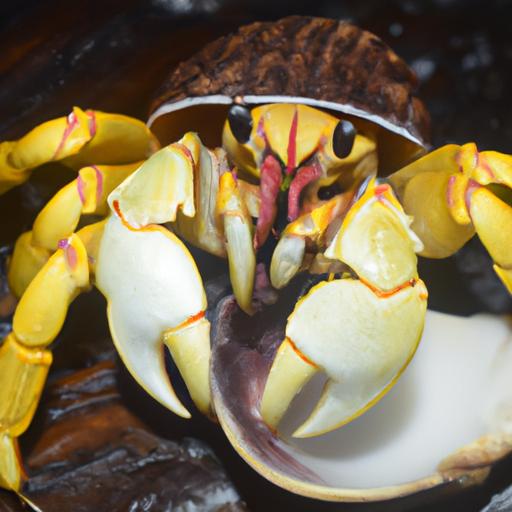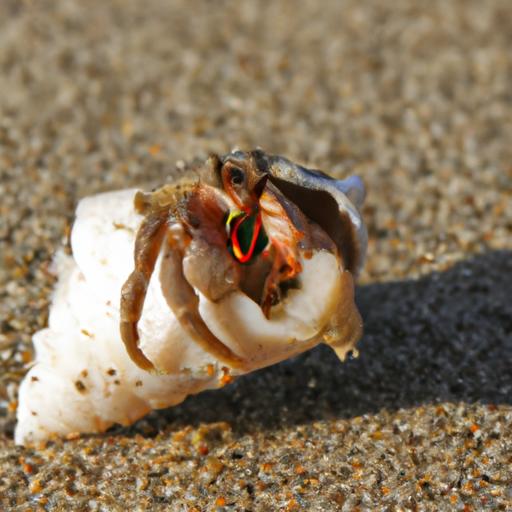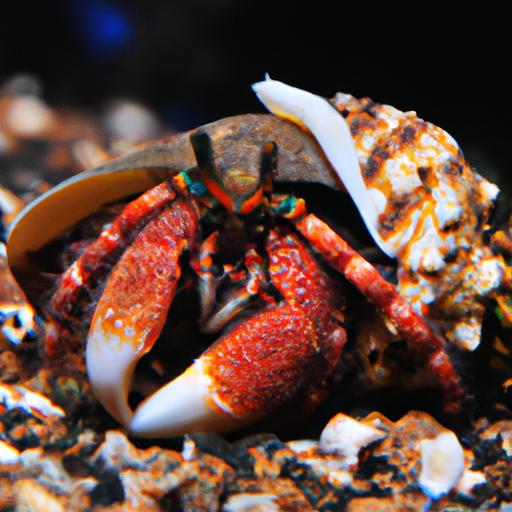Can Hermit Crabs Eat Lunch Meat: A Guide to Providing a Balanced Diet for Your Pet
Introduction
As pet owners, we strive to provide the best care for our beloved companions. If you own hermit crabs, you might wonder if they can indulge in lunch meat. These fascinating creatures require a well-rounded diet to thrive in captivity. In this article, we will explore the dietary needs of hermit crabs and address the question—can hermit crabs eat lunch meat?
A Brief Overview of Hermit Crabs as Pets
Hermit crabs are unique invertebrates that make captivating pets. With their charming personalities and intricate shells, they have gained popularity among pet enthusiasts. These little creatures are not true crabs but belong to the crustacean family. They possess soft abdomens and rely on discarded seashells for protection. Providing them with a suitable habitat and diet is crucial for their overall well-being.
The Importance of Providing a Balanced Diet for Hermit Crabs
Just like any other living being, hermit crabs require a balanced diet to thrive. In the wild, they are scavengers, feeding on a variety of food sources such as plants, fruits, insects, and decaying matter. In captivity, replicating their natural diet becomes essential to ensure their longevity and vitality. A well-balanced diet plays a significant role in their growth, molting process, and overall health.
Stay tuned as we delve deeper into the dietary requirements of hermit crabs and explore whether lunch meat can be included in their meals. Remember, providing the right nutrition is key to keeping these captivating creatures happy, healthy, and thriving.
Understanding the Dietary Needs of Hermit Crabs
A. Natural Diet of Hermit Crabs in the Wild
To better understand the dietary needs of hermit crabs, it’s essential to examine their natural diet in the wild. These fascinating creatures are opportunistic scavengers, feasting on a wide range of food sources. They consume plant matter, fruits, algae, decaying vegetation, small insects, and even dead animals. This diverse diet provides them with the necessary nutrients to support their growth and survival.
B. Nutritional Requirements of Hermit Crabs in Captivity
When we bring hermit crabs into our homes as pets, it becomes our responsibility to replicate their natural diet to the best of our ability. Meeting their nutritional requirements is crucial for their overall well-being. Here are some key nutrients that are essential for hermit crabs:
1. Protein:
Protein is a vital component of a hermit crab’s diet, supporting muscle development, growth, and molting. Good sources of protein for hermit crabs include dried shrimp, fish flakes, and small pieces of cooked meat.
2. Calcium:
Calcium is crucial for the development and maintenance of a hermit crab’s exoskeleton. It is essential to provide calcium-rich foods such as crushed eggshells, cuttlebone, and certain types of seaweed.
3. Vitamins and Minerals:
Vitamins and minerals play a crucial role in the overall health of hermit crabs. Offering a variety of fruits, vegetables, and leafy greens can help meet their vitamin and mineral requirements.
Understanding the natural diet of hermit crabs in the wild and the nutritional needs they have in captivity provides a solid foundation for creating a balanced diet for your pet. By replicating their natural diet to the best of our abilities, we can ensure their optimal health and well-being.
Can Hermit Crabs Consume Lunch Meat?
Explaining the Concept of Lunch Meat
Lunch meat, often found in deli sections, is a processed meat product typically used in sandwiches and salads. It includes various types of cured or cooked meats, such as ham, turkey, chicken, beef, or salamWhile it may seem tempting to offer a tasty treat like lunch meat to your hermit crab, it’s essential to consider their specific dietary requirements.
Factors to Consider Before Offering Lunch Meat to Hermit Crabs
Before introducing lunch meat into your hermit crab’s diet, there are several factors you should carefully consider:
1. Nutritional Value:
Hermit crabs require a diverse range of nutrients for optimal health. Lunch meat is often high in sodium, which can be harmful to hermit crabs. Excessive sodium intake may lead to dehydration and electrolyte imbalances, ultimately affecting their well-being. It’s crucial to prioritize foods with balanced nutritional profiles that align with their dietary needs.
2. Additives and Preservatives:
Processed lunch meats often contain additives, preservatives, and flavor enhancers to extend their shelf life and enhance taste. These additives, such as nitrates and nitrites, can be harmful to hermit crabs and may negatively impact their delicate digestive systems. It’s best to avoid exposing them to potentially harmful substances.
Considering these factors, it is generally recommended to avoid feeding lunch meat to hermit crabs. Opting for natural, fresh, and organic food options ensures a more suitable and nutritionally balanced diet for these captivating creatures. In the next section, we will explore potential risks associated with feeding lunch meat to hermit crabs and provide alternative food sources that are safe and beneficial for their well-being.
Potential Risks of Feeding Lunch Meat to Hermit Crabs
A. High Sodium Content in Lunch Meat
When considering feeding lunch meat to your hermit crabs, it is essential to be aware of the high sodium content present in most processed meats. Hermit crabs have delicate systems that are sensitive to excessive salt intake. Consuming foods high in sodium can lead to dehydration and electrolyte imbalances, which can be detrimental to their health.
To maintain a healthy balance, it is crucial to provide your hermit crabs with low-sodium options. Opt for natural sources of protein, such as cooked fish or insects, which are healthier alternatives to lunch meat. By avoiding high sodium foods, you can ensure that your hermit crabs thrive in a safe and optimal environment.
B. Chemical Additives and Preservatives in Processed Lunch Meat
Another factor to consider when contemplating feeding lunch meat to your hermit crabs is the presence of chemical additives and preservatives in processed meats. Lunch meats often contain nitrates, nitrites, and other additives to enhance flavor, texture, and shelf life. These additives can be harmful to hermit crabs and may cause digestive issues or other adverse reactions.
To prioritize the well-being of your hermit crabs, it is best to avoid feeding them processed lunch meat. Instead, focus on providing natural, fresh, and organic food options that are free from harmful additives. By doing so, you can ensure that your hermit crabs receive the necessary nutrients without exposing them to potential risks associated with processed meats.
Remember, the health and longevity of your hermit crabs depend on a balanced and nutritious diet. By being mindful of the risks associated with lunch meat, you can make informed decisions and provide your pets with the best possible care.
Recommended Alternatives to Lunch Meat for Hermit Crabs
A. Fresh and Organic Food Options for a Balanced Diet
When it comes to providing a well-rounded diet for your hermit crabs, fresh and organic food options are your best bet. These options ensure that your little companions receive essential nutrients without any harmful additives. Consider incorporating the following fresh foods into their diet:
-
Leafy Greens: Offer a variety of leafy greens such as kale, spinach, and romaine lettuce. These greens are packed with vitamins and minerals that contribute to the overall health of your hermit crabs.
-
Fruits: Hermit crabs enjoy a wide range of fruits, including apples, bananas, strawberries, and mangoes. Remember to remove any seeds or pits, as they can be harmful to these small creatures.
-
Vegetables: Carrots, cucumbers, and bell peppers are excellent vegetable choices for hermit crabs. These veggies provide essential nutrients and add variety to their diet.
-
Seaweed: Seaweed is a fantastic source of minerals and nutrients that mimic their natural habitat. You can offer dried seaweed or purchase specific seaweed snacks designed for hermit crabs.
B. Safe Protein Sources Suitable for Hermit Crabs
Protein is a vital component of a hermit crab’s diet, promoting healthy growth and molting. While lunch meat is not recommended, there are safe protein sources that you can offer to your hermit crabs:
-
Fish and Seafood: Cooked, unseasoned fish such as shrimp or cod can be provided as an occasional treat. Avoid using fish with high mercury content, such as tuna.
-
Eggs: Hard-boiled eggs are a nutritious protein source for hermit crabs. Ensure they are thoroughly cooked and offer small, bite-sized pieces.
-
Mealworms and Crickets: These live insects are rich in protein and can be a great addition to your hermit crab’s diet. Purchase them from reputable sources to ensure they are safe and free from pesticides.
Remember, moderation is key when introducing new food items to your hermit crabs’ diet. Gradually incorporate these alternatives while observing their preferences and reactions. Providing a varied and nutritious diet will contribute to their overall well-being and happiness.
Conclusion
In conclusion, when it comes to the question of whether hermit crabs can eat lunch meat, it is best to err on the side of caution. While hermit crabs are opportunistic eaters and may show interest in lunch meat, it is not a suitable or recommended addition to their diet. The high sodium content and potential chemical additives in processed lunch meat pose risks to their health.
Instead, focus on providing a well-rounded and nutritious diet for your hermit crabs. Fresh and organic food options, such as fruits, vegetables, and protein sources like shrimp or fish, should be the staples of their meals. Remember to include a variety of food items to mimic their natural diet and ensure they receive essential nutrients.
By prioritizing their dietary needs and offering a balanced menu, you can contribute to the overall well-being and longevity of your hermit crab companions. Always consult with a veterinarian or reputable hermit crab resource for specific dietary recommendations and guidelines.
In the end, your efforts to provide a proper diet for your hermit crabs will be rewarded with happy and thriving pets. So, let’s ensure their meals are filled with natural, nutritious choices and avoid feeding them lunch meat or any other potentially harmful foods. Your hermit crabs will thank you with their lively antics and vibrant shells!
